Working in sales is hard. You have to know the product that you’re selling and you need to possess certain soft skills like active listening and objection handling, that can improve chances of you closing a deal. Thus, salespeople must learn a lot of things before they can become truly great at their art, which can only be handled through employee training.
However, unlike many other jobs that let employees put their errands on a more or less predictable weekly schedule, salesmen often find themselves working overtime, whether organizing pipelines, going after BANT prospects, or chasing the ever-elusive ‘white whale’ deal. It also doesn’t help that some sales reps work “in the field,” which makes it extremely hard to gather them in one place for classroom-based training.
Luckily, with the power of e-learning, you don’t have to gather your sales stars in a meeting room just so they can share a piece of knowledge with their less experienced colleagues. Newbies don’t even have to be in front of a computer to learn a super-efficient selling technique or teach themselves the basic principles of active listening. All it takes nowadays is connecting each team member’s smartphone to the Internet, plus software called a learning management system (LMS) for storing training content and tracking employees’ progress.
Here are the areas of sales training that a good LMS can help you with:
- Onboarding – helps make sure that all sales newbies start with the same base knowledge of your product, the company’s code of conduct and corporate culture.
- Product training – boosts employees expertise on your product and tests it. See who might be slacking. Also, save time, as the more experienced workers won’t have to explain the same stuff again and again every time there is a newcomer.
- Standards and practices training – every sales manager should know their pipeline stages like the back of their hand. Also, they need to be 100% confident with what the next step in the current deal should be.
- Check which of your staff members performs better – let workers compete over who completes quizzes with fewer errors or finishes more optional courses a month. Find out who’s putting more effort into studying and invest in the most hardworking specialists.
- Updating training materials – when training is digital, there’s no need to reprint brochures or gather an exceptional training event in case of some important changes in your product line. With e-learning, you just need to edit and reupload the content that needs to be changed. The new version will be automatically sent to all employees that were enrolled in the old course.
Today, we’ll look at the best 5 learning management systems that will help your business turn sales newbies into top-performers faster and keep weathered old hands sharp.
LMS for Sales Training – Quick Comparison Chart
| LMS | Type of solution | Distinctive features |
| 1. iSpring Learn | A cloud-based LMS that is accessible to e-learning beginners and complex enough for more experienced online training users. |
|
| 2. TalentLMS | A cloud-based training platform that best suits small to medium-sized businesses. |
|
| 3. Adobe Learning Manager | Adobe’s take on the now ubiquitous cloud-based LMS concept. Best suited for large businesses. |
|
| 4. Docebo | An AI-powered training platform that analyzes uploaded content (including video) and automatically tags it to make finding the right training content easier for learners. |
|
| 5. SkyPreP | A simple LMS that would allow you to start training your sales team with a minimum of hassle. Available in 19 languages. |
|
Mandatory Features for a Sales Training LMS
- Mobile learning. Being able to study on the road is a must, whether it’s an Uber you ordered to visit a local client or a plane taking you to important negotiations with a Fortune 500 company. This must include a mobile app that allows learners to download training content and study offline in case they are not only on the road but also offline.
- Webinars. Most salespersons are fairly social people, which means you mustn’t keep them from interacting with their colleagues for too long. Even though some of your salespersons might be distributed around the country or even around the globe, webinars will help your employees bond into a strong, cohesive team. Occasional video meetings with seasoned mentors will also help rookies understand your company values and feel they are a part of the collective.
- CRM integration. CRM is the bread and butter of modern-day sales force. If an LMS system connects with your CRM, you should be able to see how the training process affects workers’ sales success and make adjustments if needed.
- Gamification. Sales is not sports, but it’s almost as competitive and you’ve got to keep it in order to help the most talented sales folks up their game. Gamification motivates workers to take their online training to new levels by allowing them to earn achievements and compete for a higher ranking in leaderboards.
- Assessments. Sometimes, a simple test is not enough to evaluate how good of a sales specialist you have on your team. If you need users to write down, or even better, record their answers and upload them to the LMS platform, so that one of your training managers can rate them, then you need assessments.
- Analytics. No successful online training is possible without visual feedback on employees’ performance. Choose a sales training platform that can give you a comprehensive picture of how your workers study their e-learning.
I’ve chosen 5 top LMSs suitable for sales training that possess most, if not all, of the features mentioned above. Let’s take a look at how they compare and what extra stuff you get with each of the training platforms I selected.
1. iSpring Learn
Rating: 4.6/5 from 133 reviews (Capterra)
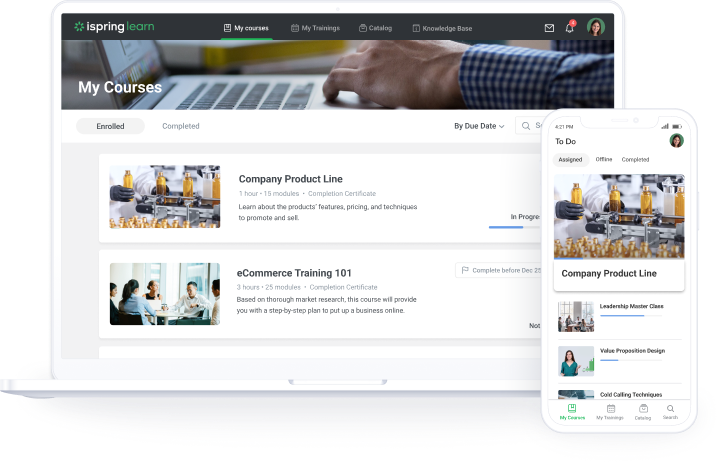
Quick review
iSpring Learn is a cloud-based LMS system with a 30-day free trial, which means that you won’t need to bother paying for hosting, installing, and maintaining it – this will all be taken care of by the vendor. It has unlimited storage for your training content too!
This learning management system has a built-in content authoring tool that you can use to create responsive bite-sized learning with images, videos, and knowledge checks at a fast pace. It’s very easy to update these learning modules on the fly, if, for example, your product line changes. Thus, your sales department will be among the first to learn about the new product updates, not the last, as often happens.
In addition, it comes bundled with a desktop authoring toolkit, iSpring Suite. This monster of a software will allow you to create interesting lessons, training videos and quizzes on your computer and upload them to the cloud where iSpring Learn is hosted. One thing that is especially great about this accompanying tool is that it can build branched dialog scenarios. These LMS features are very useful for training sales managers because they can teach an employee how to handle a conversation with a prospect and how to handle objections from different types of clients.
The platform integrates with the Zoom and MS Teams services seamlessly to allow trainees to connect with their mentors remotely. If the entire team is at the office, you can schedule an offline event via the built-in calendar – emails with an Outlook invitation will be generated and sent automatically.
It also has gamification with achievements and a leaderboard. But, most importantly, this training platform offers managers the mobility they deserve with a mobile app that learners can use to download their training and view it even when they’re offline.
Integrations
Video conferencing
Zoom
Microsoft Teams
Calendar
Microsoft Outlook
CRM
Salesforce
Bitrix24
HRIS
BambooHR
PeopleWeek
Platform for all automations
Albato
eCommerce
Shopify (coming soon)
Tilda Publishing (coming soon)
Pricing
iSpring offers two types of subscription – Start and Business, with Business coming with more advanced features. The price depends on the subscription you choose and the number of learners who enter the platform during a month. For example, the plan for 100 learners/month (Start subscription) costs $2.87 per learner.</aclass=”position_1″>
Goodies I found
- Easy-to-navigate interface
- Built-in responsive course builder
- Integrates with a desktop authoring tool – iSpring Suite
- Blended learning
- Connects with Zoom and MS Teams
- 24/7 technical support
My final opinion
iSpring Learn makes a good choice for a sales training LMS, thanks to its smooth performance and appealing user interface. Integration with Zoom and MS Teams will allow you to include virtual training sessions in the training program, while a reliable iOS/Android app will help your sales force study during their business trips and commutes.
2. TalentLMS
Rating: 4.7/5 from 503 reviews (Capterra)
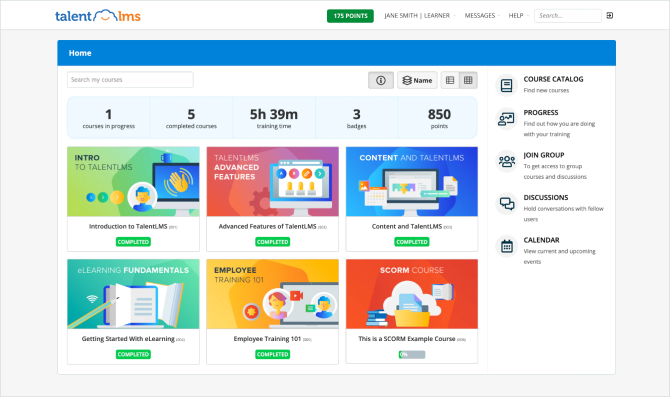
Quick review
TalentLMS supports some of the most popular e-learning standards – SCORM 1.2 and xAPI. If you’d like to create something from scratch for your sales training course, it lets you build quizzes right in your browser and make them a part of onboarding or product training for sales. All questions can be saved in a question bank, so you can reuse them for a new quiz at any point. Also, if you don’t have any training content developed yet, it can help jumpstart your e-learning program with a library of readymade courses on soft skills.
It can be integrated with GoToMeeting or Zoom for webinars that you can make a part of any learning program along with training content like SCORM. TalentLMS supports “multi-tenancy,” which lets you pick a distinct design for every single one of your sales offices. This can come in handy if, for example, you own dozens of dealerships around the country under a few different brands that, when it comes to training, all need to take similar sets of courses.
TalentLMS has gamification and there’s an automation engine that lets admins trigger a chain of events, like sending emails on certain occasions. This sure helps take some weight off admins’ shoulders. There’s an app for iOS and Android that allows learners to download any type of content and study it offline. This will come in handy for those sales managers that often find themselves outside of a stable mobile network connection.
Pricing
Based on the number of active learners in a month, the pricing for TalentLMS starts from $149/month for up to 100 learners.
Goodies I found
- You can create tests and surveys in your browser
- Reports can be customized and scheduled for automatic delivery to a selected recipient(s)
- Open course catalog
- Integrates with BambooHR and Zapier
My final opinion
This LMS checks most of the boxes on my list but, I wish reports were more comprehensive and there were more question types in the built-in quiz maker. Nevertheless, this learning management software is a good choice for training your sales staff.
3. Adobe Learning Manager (formerly Adobe Captivate Prime)
Rating: 4.3/5 from 670 reviews (Capterra)
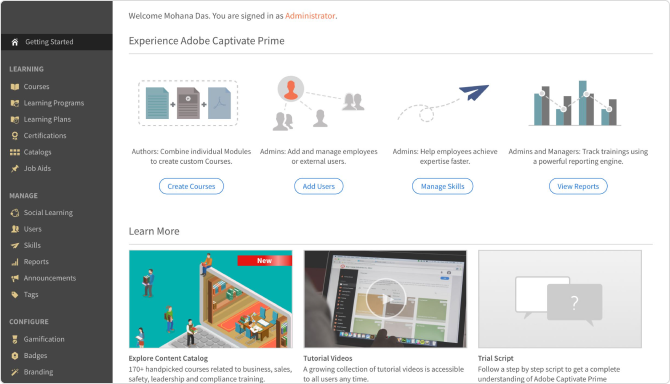
Quick review
Unlike the two LMS systems above, Learning Manager doesn’t feature any authoring capabilities, which means you’ll need to buy an authoring tool separately – so remember to add that to your budget. Luckily, it has a library of off-the-shelf training content that you can pay to get access to.
Learning Manager features a number of canned reports, but the true power of its analytics is in custom reports that you can build from the ground up. You have complete control over what data is displayed vertically and horizontally. Plus, there are few types of graphs that can be added to supplement the numbers.
There’s a wide selection of third-party services that can be integrated with Captivate Prime: BlueJeans, Zoom, Salesforce, LinkedIn Learning, and Connect – a webinar platform from Adobe. Your sales reps can install a special desktop app on their computers in order to be able to record video and share it with their fellow salespeople, bringing the true power of so-called social learning to the table. For example, an experienced veteran can record and share a fascinating story about closing the toughest deal of their career and what they learned from it.
Pricing
There are two pricing models:
- Registered user pricing model depends on the maximum number of learners that can register with the platform each month. It works for situations in which you know that you won’t exceed that number. In that case, the price starts at $4/month per learner.
- Monthly active user pricing model is more suitable for organizations where the number of learners fluctuates from month to month. If that is the case, the Adobe pricing page says you need to contact them to discuss the costs.
Goodies I found
- Flexible reporting with graphics, report customization, and scheduling
- Creating multilingual e-learning is easy
- Social learning and gamification will boost your workers’ motivation and better their results
- Gamification includes badges, experience levels, and a skill system
My final opinion
Adobe is one of the biggest players in the e-learning market, so it comes as no surprise that its product is one of the top contestants in the game. Great enrollment management capabilities and easy translation of training content make this LMS platform one of the best solutions for sales training in large multilingual companies.
4. Docebo
Rating: 4.2/5 from 123 reviews (Capterra)
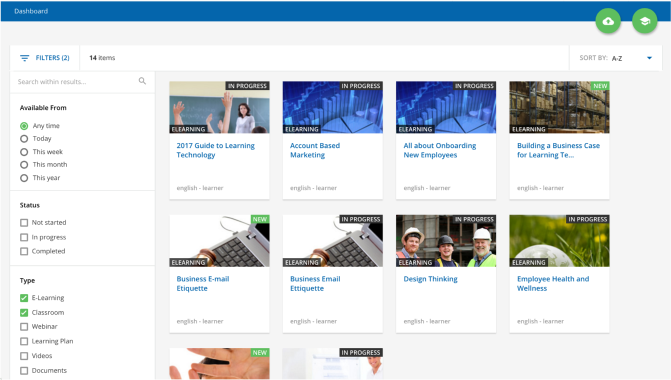
Quick review
Docebo is an old guest on my test lists – it came a long way since the first few releases. Right now, it’s a cloud-based LMS suitable for sales training with a bunch of content formats supported: SCORM and xAPI, video, and audio. It has a simple HTML content editor built in, and the vendor claims that it’s the first AI-powered LMS in the world. But the AI doesn’t do much aside from analyzing all content you upload to the platform and automatically tagging it according to what it heard in the audio/video.
There’s a marketplace of courses that were made by third-party instructional designers – these cover the most important sales-related soft skills like objection handling, so you don’t have to create your own sales training from scratch.
The built-in quiz editor supports about 8 question types, but its interface feels a bit outdated and unintuitive. There’s a bunch of options that will let you integrate the platform with your favorite third-party software that we all use on the web: Vivocha, WordPress, Slack, Google, Optimizely, Zendesk, Shopify, Analytics, and Google Drive. There’s also a cluster of webinar services it can be integrated with, like BlueJeans, AdobeConnect, Zoom, GoToMeeting, and Webex.
Pricing
Pricing is not listed on the Docebo website. So, if you’d like to get details, you’ll need to contact their sales team.
Goodies I found
- Reports can be customized and scheduled; this is an extension available only with the higher-priced plans
- Features AI that should help your employees find better e-learning content quicker by analyzing everything you upload to the platform
- Customization – lots of branding options; you can even create your own mobile learning app and publish it for an additional price
My final opinion
Docebo is a very decent LMS for training your sales staff with lots of features and, sadly, a user interface that is a little too complicated. I strongly recommend buying it if you have some prior experience with learning management systems. If you don’t have such experience, you might find yourself buried in their not-so-well-organized Knowledge Base for a couple of days.
5. SkyPrep
Rating: 4.7/5 from 143 reviews (Capterra)
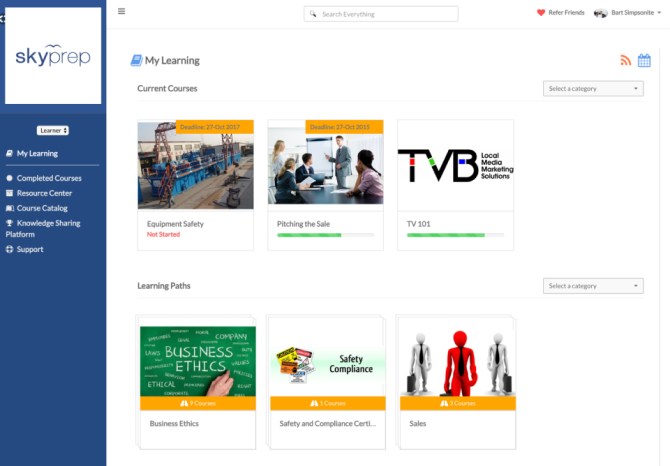
Quick review
SkyPrep is a simple training platform suitable for the sales department with functionality on par with its more serious competitors. Its interface is clean and easy to understand, so navigating it for the first time rarely causes any confusion.
It features a basic authoring tool that allows you to create learning courses from little blocks containing images and text snippets. SkyPrep also has a built-in quiz editor with just 4 question types, so you can create quizzes right in your browser without having to upload them to the platform as SCORM. In addition to these options, it provides you with access to the OpenSesame course library where you can pick from hundreds of off-the-shelf courses made by e-learning specialists, including “Sales ABC: Always Be Closing” and “Basic Selling Skills from A – Z”.
There are few simple reports that don’t provide enough data for real analytics, but there’s a report builder that you can use to create your own types of reports. It has a mobile app that learners can install on their smartphones to stay on track with their training. Unfortunately, it doesn’t allow you to download training content to view it offline. Also, there are no gamification options available with this one.
Pricing
Pricing is not listed on the SkyPrep website. So, if you’d like to get details, you’ll need to contact their expert.
Goodies I found
- Integrates with OpenSesame course library
- Simple and clean UI
- BigBlueButton and ClickMeeting integrations for webinars
- Available in 19 languages
My final opinion
SkyPrep would be a great starting point for companies that have never used an LMS before but would like to try one out before they purchase a long-term solution. Some confusion may arise from pricing plans, as some of the advanced features are only included with the higher-priced plans.
To Sum Up
Sales might not be rocket science, but without a sales team, no business would last a month. It’s important to maintain your salespeople trained and keep the flow of new talented and educated specialists coming, which can be solved nowadays with the power of digital training and mobile learning in particular. I hope that this article provided some insight into what functionality to look for in an LMS for sales training so you can use it when choosing the first online learning platform for your business.
Do you use an learning management system to train your sales staff? If so, I’d very much like to hear your thoughts on it in the comment section below.


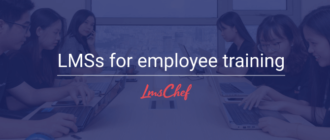




Like!! Really appreciate you sharing this blog post.Really thank you! Keep writing.
Thank you so much for your feedback! I’m glad you like the content
Very rightly stated David, sales field force is the most crucial piece of the cycle and to enable them should be the goal of all leaders and managers. We ourselves with our platform are trying to achieve the same goal. Would be great if you had a look at the same
Thanks for your feedback! What platform are you talking about?